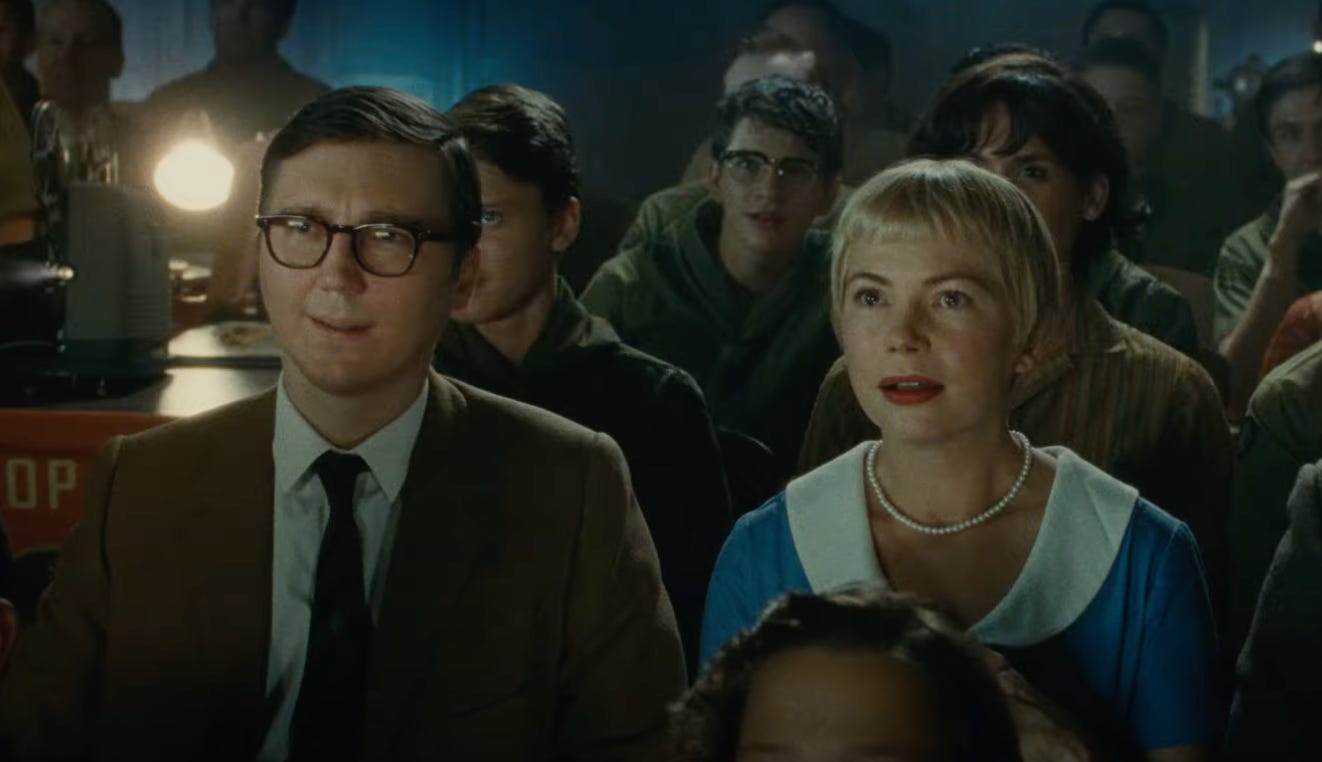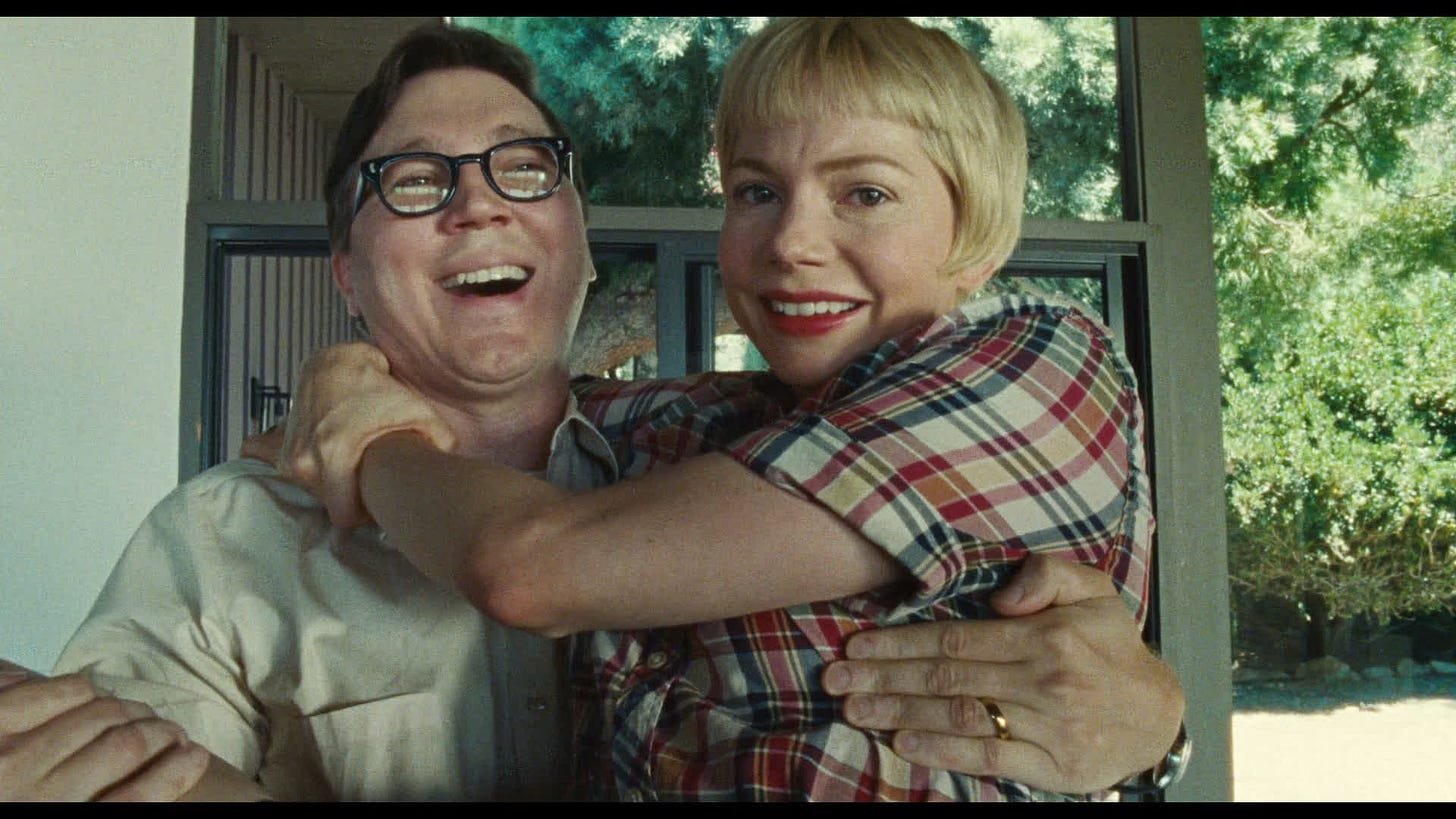Review: Steven Spielberg's "The Fabelmans"
A war for autobiographical supremacy between Spielberg the cinematic master and Spielberg the cloying sentimentalist
If they live long enough, many if not most great filmmakers wind up making a reflexive piece about their life and/or art: Fellini’s 8 ½ , Tarkovsky’s Mirror, Kurosawa’s Dreams, Malick’s The Tree of Life, Cuarón’s Roma, or (in a slightly more oblique way), Hayao Miyazaki’s The Wind Rises. That Steven Spielberg would eventually join these ranks was probably inevitable, but some directors are better equipped to do this than others. How the ‘creative autobio’ piece would work for this particular filmmaker was a genuinely open question for me going into The Fabelmans.
Spielberg is unquestionably one of the greatest to ever sit in the director’s chair, and clearly one of the most preternaturally talented. The man speaks in film more fluently than most of us speak our native tongue. His skill for visual storytelling, across a wide array of genres, is second to none, and has not waned one iota with time. To see him reflect on a life in the pictures and where those talents and impulses come from, how he learned his craft and what role it played in his foundational memories of adolescence, would of course be welcome.
But Spielberg is also a director who, over time, has developed a parallel streak as a cloying sentimentalist. I say this with love, as many who have made the same observation do. While his talents behind the camera have never wavered, they have sometimes been unfortunately tempered by an inability to land the punch, to go for the gut and push towards the deepest possible truth, instead of pulling at the heartstrings for a more surface-level catharsis. Where he could once end a movie with savage honesty – most obviously in Close Encounters of the First Kind – he gradually turned into the guy who’d ease up before making the follow-through, like in War of the Worlds when the son inexplicably survives, or let an otherwise note-perfect film like Lincoln continue five minutes past a hauntingly perfect, suggestive conclusion to rub our nose in the tragedy. For all the films he’s made that can comfortably be considered masterpieces, up to and including last year’s West Side Story, there’s also dreck like Hook or War Horse that are drowning in unearned sentimentality, cloying at the heart without a center of substance, Thomas Kincade paintings springing into motion and leaving a unpleasant aftertaste of false sweetener in the mouth. Would a lightly-veiled memoir film about his childhood bring out the best in Spielberg, or invite his worst impulses to run rampant?
The answer isn’t simple. I want to say that these dual impulses – the master filmmaker who can be deathly lean and precise in telling a story through images, and the sentimental fabulist who can’t resist steering towards the tearjerker – are at war in The Fabelmans, that they result in a movie split evenly down the middle between uncomfortably saccharine familial memories and rapturous, inspiring reflections on budding filmmaking talent, but it’s not that easy a split. Both of those sides are, indeed, on display, but the way they sit together is pricklier and more uneasy than I’d anticipated, and become more challenging for me to grapple with the longer I sit with it.
Everything The Fabelmans has to say or show about filmmaking soars; of that much I am sure. There is so much good, loving detail, honest and sometimes brutally insightful, about becoming artistically obsessed at a young age – about how one’s parents react, about where one looks for inspiration, about the fine line between enthusiastic theft and genuine inspiration that defines a young artist coming into their voice. Spielberg recreates his early days of shooting on 8mm and editing with scissors and tape with loving detail, and introduces each new tool – a real hand-cranked editing machine, a Bolex, a 16mm Arriflex – with positively infectious glee. It’s nostalgia, but Spielberg’s earned it – and moreover, he’s able to cut deeper throughout, to reflect on the weird and wonderful and even scary things film can do and can reveal. A scene of Spielberg stand-in Sammy Fabelman discovering a family secret while cranking through home movies shot on a camping trip is a brilliant, emotionally lacerating highlight. Even better is a thread in the final act about an anti-semitic high school bully and how Sammy winds up depicting him in a senior class film, resulting in a breathtakingly tense and provocative confrontation about what a constructed series of images can reveal about its subject.
Oh, and the film’s finale, with David Lynch walking on for a thunder-and-brimstone cameo as an aged John Ford, who Sammy meets in his first day on the job at a TV studio? Phenomenal. Pure lightning-in-a-bottle energy that had me shaking in my seat. It’s electric. It’s as good a scene as Spielberg has ever directed.
The other half – Sammy and his family, particularly the material about his mother and father, played by Michelle Williams and Paul Dano – is where I feel more mixed and uncomfortable. This is where Spielberg the sentimentalist rears his head, but not as consistently or as simply to allow me to draw simple conclusions.
Here’s a thought I keep coming back to: Making art about our parents is hard. Hell, talking about our parents is hard, as any therapist will surely attest. Our parents are people we intimately know for as long as our memory stretches back, and simultaneously people we understand precious little about. Their interiority is hard for us to grasp, to define, to give shape to, because we are so close to them, are molded by them in so many ways, and because they lived whole lives before our existence and in gaps of our memory and understanding we only come to understand the size of the older we get. It is hard to be honest about them, purposefully or not, and harder still to get it ‘right.’
Spielberg stumbles here, I think, mired in that hazy gray area of wanting to simultaneously represent the things about these people that made him who he is and let them live and breathe as autonomous three-dimensional characters. I’m not sure either goal is truly satisfied. Williams and Dano are great – Dano especially, for my money, in the uncomfortable weariness and distance with which he imbues the character – but I never fully grasped these two as human beings. Williams is as good an actress as exists, and she’s bringing the full weight of her talent to bear on a character who never really escapes the realm of caricature. It perpetually feels like Spielberg is unable to cut to the heart of this person beneath the many eccentricities used to illustrate her. At times, Williams will come close to making Mitzi feel like a living, breathing, real human person, and then in the next scene she’ll come across as a barely-functioning child, so emotionally helpless it all feels like cruel, simplistic exaggeration.
It’s like we can’t fully see her. She’s there, in a body, speaking and moving, but Mitzi rarely feels like more than an impression to me, a web of tics and oddities that feel like they’re hiding, rather than revealing, the complicated humanity underneath. Would I be able to do better if tasked to tell a story about my own mother? Certain moments resonated for me here, like I saw my own mother flashing for an instant on screen in what Spielberg and Williams were conjuring, and then I’d think about it and wonder if all I was seeing was my own reductive impression of my mother – a thought I’d be uncomfortable sharing with the world, because I would fear it a painful reduction of a person I love deeply and know I do not and cannot comprehend enough to represent with clarity. Spielberg, obviously, has more age and experience than me, has if nothing else had more time on this earth to reflect on this person and he would artistically portray her, and yet it feels incomplete and insufficient, vacillating for me between feeling like Spielberg is being unnecessarily cruel and reductive to the woman who raised him, and letting his foot off the gas to keep her from coming fully into focus, letting her remain an apparition without confronting any of the real depth raised by her characterization.
Williams’ and Dano’s respective final scenes are perhaps where Spielberg the sentimentalist is at his most visible, and where the movie fails most obviously. Whatever difficult truths or meaningful catharsis it feels like we could say with these characters gets washed away in closing moments that choose easy platitudes and, yes, cloying sentiment over the harder, more unresolvable emotions that surely define even the healthiest relationships between parents or children. Spielberg chooses to prioritize the assurance that both these people loved their children (er, child – Sammy, like Steven, has three younger sisters, but they so fail to register as characters that I couldn’t tell you any of their names) over pushing further towards considering any of the difficult questions their actions and relationship over the course of the film have brought up. In the end, the raw and prickly emotions of Close Encounters’ parental abandonment story, told by a much younger artist, feels more honest and certainly more thought-provoking in what it says about family and parenthood. The Fabelmans feels muddled and misguided by the haze of memory and time and the desire to wrap up in a bow things that cannot possibly be contained in boxes.
It is, of course, a beautiful movie. As with last year’s West Side Story, stalwart Spielberg collaborator Janusz Kaminski does extraordinary work with light and color and texture of celluloid. Spielberg’s gift for visual storytelling, for which he is in the uppermost tier of filmmakers living or dead, is on full display, and there is a laundry list of images that will take one’s breath away in how elegantly they cut to the heart of a feeling or an idea. The film is generally light on its feet and easily stands as one of Spielberg’s funniest movies, with an exceptional sense of comic timing that keeps things lively over the long run-time.
For better and for worse, The Fabelmans is an honest reflection of the filmmaker Spielberg has become, warts and all. It contains the best of him and, if not the worst of him – there’s nothing here remotely as egregious asWar Horse – then a lot of the things that sometimes lead him in that direction. It’s a film I’m mixed on, but in a way where I feel very grateful for its existence, for the opportunity to grapple with it. I don’t believe this is the most insightful or raw autobiographical statement Spielberg is capable of making, but what it reveals about his fascinating contradictions as a filmmaker has plenty of value in its own way.





